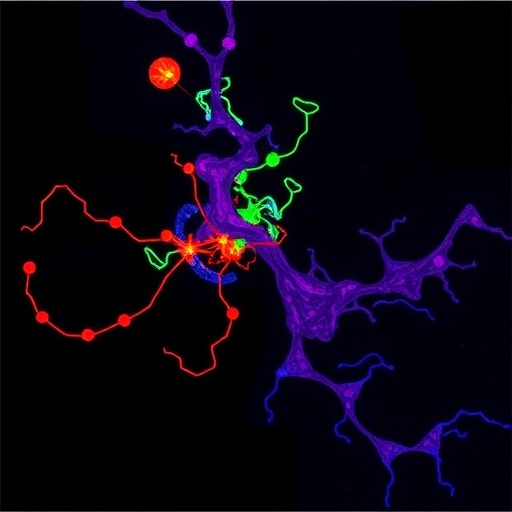
A groundbreaking investigation into the molecular intricacies of breast cancer has unveiled pivotal roles for a cluster of microRNAs—miR-23a, miR-27a, and miR-24–2—in regulating pathways central to tumor progression and patient survival. Published in BMC Cancer, this study elucidates how these tiny RNA molecules dynamically interplay with critical genes, particularly glycogen synthase kinase 3 beta (GSK3β), thereby influencing the behavior of breast cancer cells and opening novel avenues for targeted therapy.
Breast cancer remains one of the most formidable health challenges globally, characterized by high mortality rates and formidable resistance to existing treatments. The heterogeneity of tumor types and the frequent absence of effective targeted therapies exacerbate these difficulties. Addressing this, the research team from Gupta et al. has focused on microRNAs, which are short, non-coding RNAs known to modulate gene expression post-transcriptionally and are increasingly recognized as crucial players in cancer biology.
This study specifically zooms in on a microRNA cluster—miR-23a, miR-27a, and miR-24–2—known to be transcribed together and frequently dysregulated in cancers. Utilizing advanced computational analyses, the researchers first identified key gene targets commonly regulated by these microRNAs. Among these, GSK3β stood out prominently, a serine/threonine kinase known for its multifaceted role in diverse signaling cascades including the Wnt/β-catenin pathway, which is intimately involved in oncogenesis.
Through quantitative real-time PCR assays (qRT-PCR) conducted on 26 matched pairs of breast tumor and adjacent normal tissues, combined with assays in MCF7 and MDA-MB-231 breast cancer cell lines, the study confirmed a marked downregulation of all three microRNAs within tumor samples. This downregulation suggests a loss of their tumor-suppressive effects, potentially facilitating unchecked tumor growth and metastasis.
The researchers further employed dual-luciferase reporter assays to validate direct interactions between these microRNAs and their predicted target sequences on the GSK3β gene. This approach decisively demonstrated that miR-23a and miR-24–2 exert their regulatory effects by binding to the 3’ untranslated region (UTR) of GSK3β mRNA, effectively modulating its expression. Intriguingly, miR-27a also influenced additional oncogenic pathways, highlighting the cluster’s complex and multifactorial influence over tumor biology.
The functional consequences of manipulating these microRNAs were profound. Western blot analyses revealed that altering the levels of miR-23a, miR-27a, and miR-24–2 impacts the expression of genes associated with epithelial-mesenchymal transition (EMT), a critical process by which epithelial cells acquire migratory and invasive properties. This regulation is vital because EMT underpins metastasis, the foremost cause of breast cancer mortality.
Invasion assays demonstrated that enhancing the expression of these microRNAs in breast cancer cells curtailed their ability to invade extracellular matrices, thereby highlighting their suppressive roles in metastatic dissemination. Simultaneously, cell cycle analyses indicated that these microRNAs modulate cell division dynamics, further underscoring their multifaceted impact on cancer progression.
The study also delves into the downstream effects on signaling pathways, most notably ERK and Wnt/β-catenin, both of which are well-established in fostering cancer cell survival, proliferation, and metastasis. By targeting GSK3β—a crucial nexus point in these pathways—the microRNA cluster effectively disrupts signaling cascades that are otherwise hijacked by tumor cells for malignant advantage.
Analyzing clinical datasets through Kaplan–Meier survival plots, the team uncovered compelling correlations between gene and microRNA expression levels and patient outcomes. Notably, diminished SP1 and NCOA1 expression predicted poorer prognoses, while paradoxically, elevated GSK3β was associated with reduced survival rates. These findings underscore the nuanced and context-dependent roles these molecules play within the tumor microenvironment.
Beyond highlighting the intricate molecular dance between microRNAs and their targets, the research paves the way for therapeutic innovation. Targeting the miR-23a/27a/24–2 cluster emerges as a promising strategy to recalibrate aberrant signaling and transcriptional networks, thereby stifling tumor progression and metastasis. The potential for synthetic mimics or modulators of these microRNAs could revolutionize breast cancer treatment paradigms, particularly for subtypes resistant to conventional therapies.
Importantly, the study emphasizes the discrete roles each member of the cluster plays despite their shared locus, challenging prior assumptions of their collective function. This refined understanding enables the design of precision interventions tailored to individual microRNA-mediated pathways, enhancing therapeutic specificity and minimizing off-target effects.
The implications of modulating GSK3β expression also ripple beyond oncology, given the enzyme’s involvement in metabolic regulation, neurodegeneration, and inflammation. Thus, insights from this breast cancer-focused research may stimulate broader biomedical inquiries and cross-disciplinary innovations.
Moreover, the study’s methodological rigor, combining computational predictions with molecular biology techniques and clinical data analyses, exemplifies a holistic approach essential for deciphering the complexity of cancer biology. It sets a benchmark for future investigations aimed at unraveling the multifactorial layers governing tumor behavior.
In essence, this work not only elucidates critical molecular underpinnings of breast cancer but also spotlights the transformative potential of microRNA-based diagnostics and therapeutics. As research on non-coding RNAs continues to expand, the miR-23a/27a/24–2 cluster stands out as a beacon of promise in the quest to conquer one of humanity’s most stubborn and deadly diseases.
The study by Gupta et al. thus encapsulates a significant leap forward, marrying molecular precision with clinical relevance to inspire new directions in breast cancer research and treatment. As the scientific community continues to decipher and manipulate these tiny regulators, the dream of more effective, targeted, and personalized cancer therapies moves closer to reality.
Subject of Research: Breast cancer molecular mechanisms focusing on microRNA cluster miR-23a/27a/24–2 and their regulation of GSK3β and associated signaling pathways.
Article Title: Targeting GSK3β and signaling pathways in breast cancer: role of individual members of miR-23/24/27 cluster
Article References:
Gupta, H., Raghubansi, A., Bharat et al. Targeting GSK3β and signaling pathways in breast cancer: role of individual members of miR-23/24/27 cluster. BMC Cancer 25, 737 (2025). https://doi.org/10.1186
Tags: advanced computational analyses in cancer researchbreast cancer molecular mechanismschallenges in breast cancer treatmentgene expression modulation by microRNAsglycogen synthase kinase 3 beta regulationheterogeneity of breast cancermicroRNAs in tumor progressionmiR-23/24/27 cluster in breast cancernon-coding RNAs in oncologytargeted therapies for breast cancertargeting GSK3β in cancer therapyWnt/β-catenin signaling pathway in cancer





